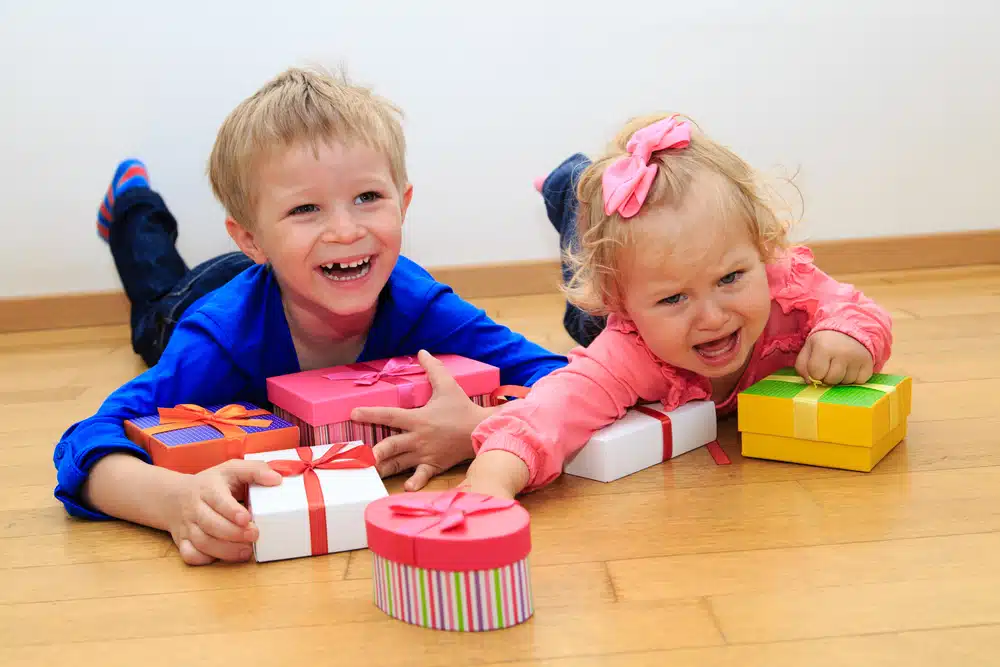What causes jealousy? How can you avoid it among your children?
Some people, children included, are born with a greater tendency toward jealousy than others. There will always be that one child in the family who’s bound to look over his shoulder when Mommy hands out treats. He’s making sure that no one gets one more jellybean than he does. But, let’s face it. Jealousy is a middah (character trait) all humans struggle with. And as parents, we don’t want to be the ones to foster it.
Here are 3 Torah-based points to ponder that will help you raise children who fargin (not reluctant or resentful; wholehearted) and celebrate each other’s successes wholeheartedly.
The “I Could Have Had That” Mindset
What is jealousy? In the Maharal’s explanation, it’s when one person has something that the other person thinks he could have had. The last few words are crucial here. It’s only because the child is in the same square as his sibling (because he feels that whatever his brother has could have been his) that feelings of jealousy begin to fester. I doubt your son is jealous of Donald Trump or Bill Gates. He’s not even jealous of the kid who got the world’s largest birthday cake! But what happens when his brother’s birthday party was more festive than his?

Jealousy only happens when two people occupy the same space. While this may be the reality in the physical sense (especially if there are eight kids in three bedrooms!) and they are sharing one set of parents and much of their stuff, it doesn’t have to be the case otherwise. In other words, giving every child his own square is the way to go to combat jealousy.
Away with the Even-Steven
If you’re like many parents, you may have the erroneous belief that by making sure that each kid gets the same portion/prize/dress/treat, they’ll all live happily ever after. This could not be further from the truth. In fact, the son of a gadol was once asked how each of his siblings were so unique and powerful. His answer? “My father treated each of us… differently.” The more overlap children have with one another, the greater their chances are to develop that negative mindset you’re trying to avoid.
Chanoch lna’ar al pi darko means exactly that. It doesn’t only mean that every child has unique temperaments that parents must address, but also that every child deserves her own path to your heart. If one kid wants to wear the grey shirt today, and the other the blue one, what’s wrong with that? It may seem like an insignificant request, but to the child, it’s her way of expressing her own identity. She doesn’t want to be a watered-down version of her sister! If one kid likes the violin and the other the piano, they don’t both need to go to the same violin teacher. Your response makes all the difference.
In the Open
Ever wished you could take out your daughter for pizza but immediately scrapped the plan because “What will Nechama say when she finds out?” Well, here’s how you can go ahead with that fun night out and leave everyone’s feelings intact. Instead of canceling the trip or swearing Devorah to secrecy for the rest of her long life, how about putting it all out in the open?
Often, we’re simply afraid to give one child more than the other because we’d rather not mess up the status quo. But when one child says, “She got more chips,” instead of denying that or rushing to the pantry to restock the little one’s bag, you can teach your child a lesson for life by saying, “You’re right. Sometimes he gets more and sometimes you do.” Case closed.




I went to a chinuch class by rebetzin spetner and she said some so true regarding jealousy: if you , the parent, are ok and clear with yourself with the reason why you gave one certain kid an extra treat (for example), then you’ll never need to swear the kid to secrecy or hide what you did because you have a clear reason. Even if the reason is “just because”